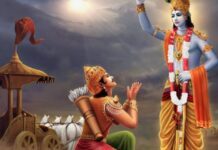श्लोक 6 – Verse 6
महाभूतान्यहङ्कारो बुद्धिरव्यक्तमेव च।इन्द्रियाणि दशैकं च पञ्च चेन्द्रियगोचराः।।13.6।।
mahā-bhūtāny ahankāro buddhir avyaktam eva cha
indriyāṇi daśhaikaṁ cha pañcha chendriya-gocharāḥ
शब्दों का अर्थ
mahā-bhūtāni—the (five) great elements; ahankāraḥ—the ego; buddhiḥ—the intellect; avyaktam—the unmanifested primordial matter; eva—indeed; cha—and; indriyāṇi—the senses; daśha-ekam—eleven; cha—and; pañcha—five; cha—and; indriya-go-charāḥ—the (five) objects of the senses;
Translations by Teachers (आचार्यो द्वारा अनुवाद):
Swami Ramsukhdas (Hindi)
।।13.6।।मूल प्रकृति, समष्टि बुद्धि (महत्तत्त्व), समष्टि अहंकार, पाँच महाभूत और दस इन्द्रियाँ, एक मन तथा पाँचों इन्द्रियोंके पाँच विषय ( — यह चौबीस तत्त्वोंवाला क्षेत्र है)।
Swami Tejomayananda (Hindi)
।।13.6।। पंच महाभूत, अहंकार, बुद्धि, अव्यक्त (प्रकृति), दस इन्द्रियाँ, एक मन, इन्द्रियों के पाँच विषय।।
Swami Adidevananda (English)
The great elements, the Ahankara, the Buddhi, the Avyakta, the ten senses, and the one, in addition, the five objects of the senses;
Swami Gambirananda (English)
The great elements, egoism, intellect, and the Unmanifest itself; the ten organs and the one, and the five objects of the senses;
Swami Sivananda (English)
The great elements, egoism, intellect, and also the Unmanifested Nature, the ten senses, and one mind, and the five objects of the senses.
Dr. S. Sankaranarayan (English)
The five great elements, egotism, the intellect, the unmanifest, and the ten organs and the five objects of the senses.
Shri Purohit Swami (English)
The five great fundamentals—earth, fire, air, water, and ether—personality, intellect, the mysterious life force, the ten organs of perception and action, the mind, and the five domains of sensation—



